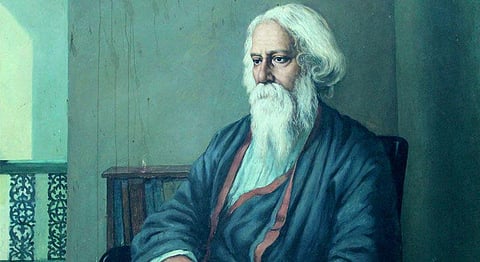
- HOMEGROWN WORLD
- #HGCREATORS
- #HGEXPLORE
- #HGVOICES
- #HGSHOP
- CAREERS
- ABOUT US
- CONTACT US

The Supreme Court, on 30 November 2016 passed a law that mandated that the National Anthem be played before every movie commences “for the love of the motherland”, as it was reported at the time. The move did more harm than good as was evidenced in verbal attacks and even physical ones, such as an incident in October 2016 when award-winning writer and disability campaigner Salil Chaturvedi, who suffers from a spinal injury could not rise to his feet, and was brutally assaulted by a couple standing in the aisle above him at a cinema hall in Goa.
The move seemed to put people off the National Anthem as no one really took kindly to the forced nationalism being shoved down their throats. It was sad actually because the emotions and the true meaning of the Anthem were getting lost in power plays and politics.
Thankfully the decree was taken back and now, it has been 107 years since the song, that rouses the spirit and tugs at the heartstrings of Indians across the land, Jana Gana Mana was sung for the first time at the Calcutta Session of the Indian National Congress on December 27, 1911. It was originally composed as Bharoto Bhagyo Bidhata in what is said to be high Sanskritised Bengali by Nobel Laureate Rabindranath Tagore as a five-stanza poem – the first being adopted as the country’s National Anthem, and annotated by Tagore himself, by the Constituent Assembly on 24 January 1950.
One of the highly debated moments when it comes to the journey of the National Anthem since its inception is the confusion about Tagore’s intentions, the circumstances surrounding the writing of Jana Gana Mana. Some believed that it was written to commemorate King George V’s visit to the Empire. The perception was, and as it was furthered by the pro-British press at the time, that the song was a salutation for the monarch. According to a report in The Hindu, “The same day, another song, written in praise of the emperor, was also sung” and the reporters of the time mixed up the two.
Tagore was apparently asked on several occasions to write in favour of the rulers (which he refused) as well as regarding the Jana Gana Mana debate. He responded, “I should only insult myself if I cared to answer those who consider me of such unbounded stupidity as to sing in praise of George IV or George V as the Eternal Charioteer leading the pilgrims on their journey through countless ages of the timeless history of mankind.”
In a letter to Pulin Behari Sen, Tagore took a stand and wrote, “A certain high official in His Majesty’s service, who was also my friend, had requested that I write a song of felicitation towards the Emperor. The request simply amazed me. It caused a great stir in my heart. In response to that great mental turmoil, I pronounced the victory in Jana Gana Mana of that Bhagya Vidhata of India who has from age after age held steadfast the reins of India’s chariot through rise and fall, through the straight path and the curved. That Lord of Destiny, that Reader of the Collective Mind of India, that Perennial Guide, could never be George V, George VI, or any other George. Even my official friend understood this about the song. After all, even if his admiration for the crown was excessive, he was not lacking in simple common sense.”
